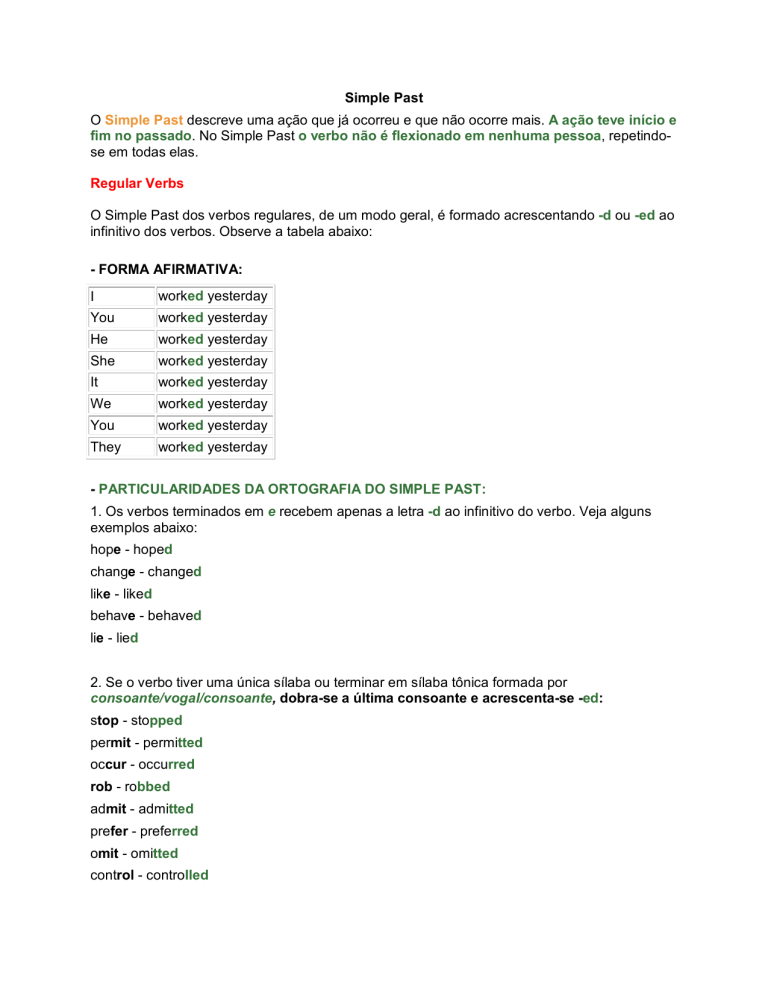
Simple Past
O Simple Past descreve uma ação que já ocorreu e que não ocorre mais. A ação teve início e
fim no passado. No Simple Past o verbo não é flexionado em nenhuma pessoa, repetindose em todas elas.
Regular Verbs
O Simple Past dos verbos regulares, de um modo geral, é formado acrescentando -d ou -ed ao
infinitivo dos verbos. Observe a tabela abaixo:
- FORMA AFIRMATIVA:
I
worked yesterday
You
worked yesterday
He
worked yesterday
She
worked yesterday
It
worked yesterday
We
worked yesterday
You
worked yesterday
They
worked yesterday
- PARTICULARIDADES DA ORTOGRAFIA DO SIMPLE PAST:
1. Os verbos terminados em e recebem apenas a letra -d ao infinitivo do verbo. Veja alguns
exemplos abaixo:
hope - hoped
change - changed
like - liked
behave - behaved
lie - lied
2. Se o verbo tiver uma única sílaba ou terminar em sílaba tônica formada por
consoante/vogal/consoante, dobra-se a última consoante e acrescenta-se -ed:
stop - stopped
permit - permitted
occur - occurred
rob - robbed
admit - admitted
prefer - preferred
omit - omitted
control - controlled
OBSERVAÇÃO: No Inglês Britânico, se o verbo termina com a letra "L", dobra-se
essa consoante mesmo que a última sílaba não seja tônica.
travel - travelled
rival - rivalled
3. Os verbos terminados em y precedido de consoante trocam o y por -ied:
study - studied
carry - carried
worry - worried
try - tried
hurry - hurried
cry - cried
OBSERVAÇÃO: Quando o y for precedido de vogal, não há mudança ortográfica,
bastando apenas acrescentar -ed ao verbo:
pray - prayed
enjoy - enjoyed
obey - obeyed
play - played
4. Os verbos terminados em consoante/vogal/consoante cuja sílaba tônica não é a
última não dobram a consoante, apenas recebem -ed:
listen - listened
develop - developed
open - opened
fasten - fastened
suffer - suffered
visit - visited
wonder - wondered
offer - offered
USOS do Simple Past:
O Simple Past é usado para expressar:
1. Ações acabadas em um tempo definido, é frequentemente usado com advérbios de
tempo como yesterday, yesterday morning, last week, last month, last night, the day
before yesterday, three years ago, in 1998, in the twentieth century, etc. O quando o fato
ocorreu pode ser expresso ou apenas subentendido.
Susan helped him last night. (Susan o ajudou ontem à noite.)
My parents traveled to Roma in 2005 and they enjoyed it a lot. (Meus pais viajaram para Roma
em 2005 e gostaram muito da viagem.)
I liked to read fairy tales when I was a child. (Eu gostava de ler contos de fadas quando era
criança.)
Yesterday we entered the class late, today we have to enter on time. (Ontem entramos na sala
de aula atrasados, hoje temos que entrar na hora.)
Those students studied hard last semester. (Aqueles alunos estudaram bastante no último
semestre.)
The Second World War ended in 1945. (A Segunda Guerra Mundial teve fim em 1945.)
2. Indicar hábitos ou situações passadas. Nesses casos é comum aparecer expressões
como when, while, whenever.
When I lived in London, I worked in a pub. (Quando morei em Londres, trabalhei em um bar.)
Whenever someone walked past the gate, the dog barked. (Toda vez que alguém passava no
portão, o cachorro latia.)
- FORMA NEGATIVA E INTERROGATIVA:
As formas negativas e interrogativas do Past Simple são feitas com o verbo auxiliar Did
(passado de Do), acompanhado do verbo principal no infinitivo sem to.
1. Forma Negativa:
Para formar uma oração negativa no Simple Past, usa-se did not para todas as pessoas, pois
como já vimos anteriormente, no Simple Past o verbo não é flexionado em nenhuma
pessoa, repetindo-se em todas elas. O verbo auxiliar (did) + not posiciona-se sempre
entre o sujeito e o verbo principal. Observe a tabela abaixo:
I
did not work
You
did not work
He
did not work
She
did not work
It
did not work
We
did not work
You
did not work
They
did not work
NEGATIVE FORM: SUJEITO + DID NOT + VERBO NO INFINITIVO SEM TO
Steve didn't work as much as Paul. (Steve não trabalhou tanto como Paul.)
She didn't work yesterday. (Ela não trabalhou ontem)
2. Forma Interrogativa:
Para formar uma oração interrogativa no Past Simple, usa-se did antes do sujeito. O verbo
permanece no infinitivo sem "to", uma vez que, no Simple Past o verbo não é flexionado em
nenhuma pessoa, repetindo-se em todas elas.
Did
I
work?
Did
You
work?
Did
He
work?
Did
She
work?
Did
It
work?
Did
We
work?
Did
You
work?
Did
They
work?
INTERROGATIVE FORM: DID + SUJEITO + VERBO NO INFINITIVO SEM TO
Did he call me yesterday? (Ele me ligou ontem?)
Why did he do that? (Por que ele fez isso?)
Did you drink wine last night? (Você tomou vinho ontem à noite?)
Irregular Verbs:
Os verbos irregulares não seguem as regras gerais de formação do Simple Past, isto é, cada
um tem uma forma própria de passado. Sendo assim, é necessário estudá-los um a um.
Ver lista dos verbos irregulares.
l drink coffee at breakfast. = l drank some yesterday.
He goes to the club every Sunday. = He went yesterday.
1. Verbos irregulares são aqueles aos quais não se acrescenta ed ou d para se formar o passado e o particípio
passado.
2. Com exceção de 'to be', a negativa e interrogativa dos verbos irregulares são feitascomo nos verbos regulares.
3. O passado dos verbos irregulares tem a mesma forma para todas as pessoas:
I went, you went, we went, etc. A exceção é o verbo 'to be' (was - were).
do make have begin
catch cost drink
eat -
past
past participle
did
made
had
began
caught
cost
drank
ate
- done
- made
- had
- begun
- caught
- cost
- drunk
- eaten
get
give go hear hit know leave -
past
past participle
got gave
went heard hit knew left -
got
given
gone
heard
hit
known
left
Past Continuous
Past Continuous é usado para:
1. Descrever uma ação em andamento num determinado momento no passado:
Fred was dancing with his girlfriend.
I was talking to my boss when you called me yesterday afternoon.
At 7:00 a.m., I was flying over San Francisco.
My father arrived when my mother was cooking.
In 2001 he was living in Dublin.
When I got up this morning the sun was shining.
What were you doing at 6:00 p.m.?
It was raining this morning.
2. Descrever ações em andamento simultâneo. Nesses casos, geralmente usa-se o
marcador while:
Susan was playing while Mary was studying for her test.
We were preparing our breakfast while he was still sleeping.
I was having a shower when the phone rang.
While my father was reading the newspaper, my brother was washing the car.
3. Para descrever uma ação que estava ocorrendo quando outra ação ocorreu.
I was talking with James when the telephone rang.
While Angelica was playing tennis, the plane crashed.
When Bob was painting windows, it started raining
FORMAS NEGATIVA E INTEROGATIVA:
1. Forma Negativa:
A Forma Negativa do Passado Contínuo é feita acrescentado-se not entre o passado simples
do verbo to be + verbo + ing) do verbo principal. Observe a tabela abaixo:
I
was not working
You
were not working
He
was not working
She
was not working
It
was not working
We
were not working
You
were not working
They
were not working
I wasn't watching TV last night.
They weren't waiting for her at the airport.
Bob and Jamey weren't sleeping when Jane got home.
She wasn't reading a book, she was reading a magazine.
NEGATIVE FORM:
SUJEITO + PASSADO SIMPLES DO VERBO TO BE + NOT + VERBO + ING
2. Forma Interrogativa:
Na Forma Interrogativa do Passado Contínuo, o sujeito posiciona-se entre o passado
simples do verbo to be e o verbo + ing.
Was
I working?
Were
You working?
Was
He working?
Was
She working?
Was
It working?
Were
We working?
Were
You working?
Were
They working?
Were you sleeping?
Were they studying for the test?
What were the children doing in the bedroom?
Was it snowing this morning? INTERROGATIVE FORM:
PASSADO SIMPLES DO VERBO TO BE + SUJEITO + VERBO + ING

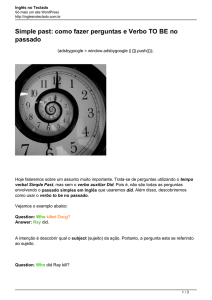
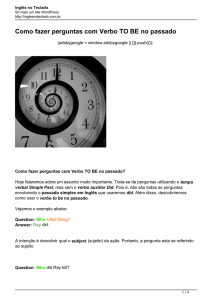
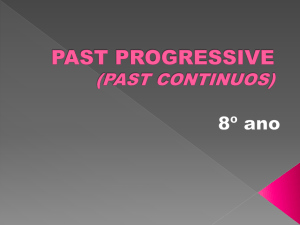
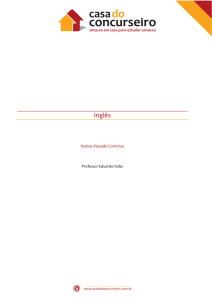
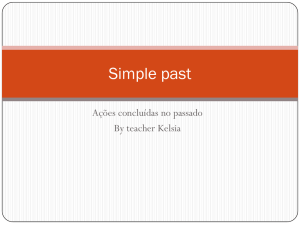
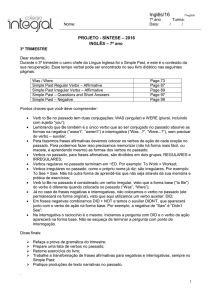
![[1] 22 Data Turma PROFESSOR / DISCIPLINA CONTEÚDO](http://s1.studylibpt.com/store/data/003113195_1-325d5632c38bd4fd4c0c1e89af27ac20-300x300.png)
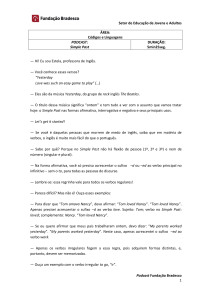
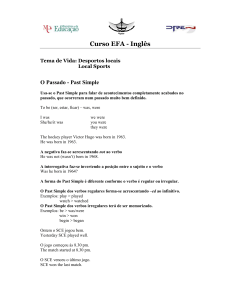
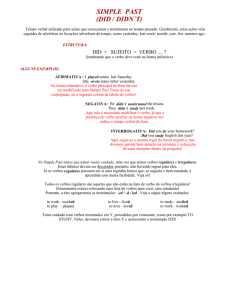

![Did + sujeito + verbo no infinitivo + ? [1]](http://s1.studylibpt.com/store/data/002476358_1-cc4b0ef8d780b2e096a6ce75d390cb18-300x300.png)